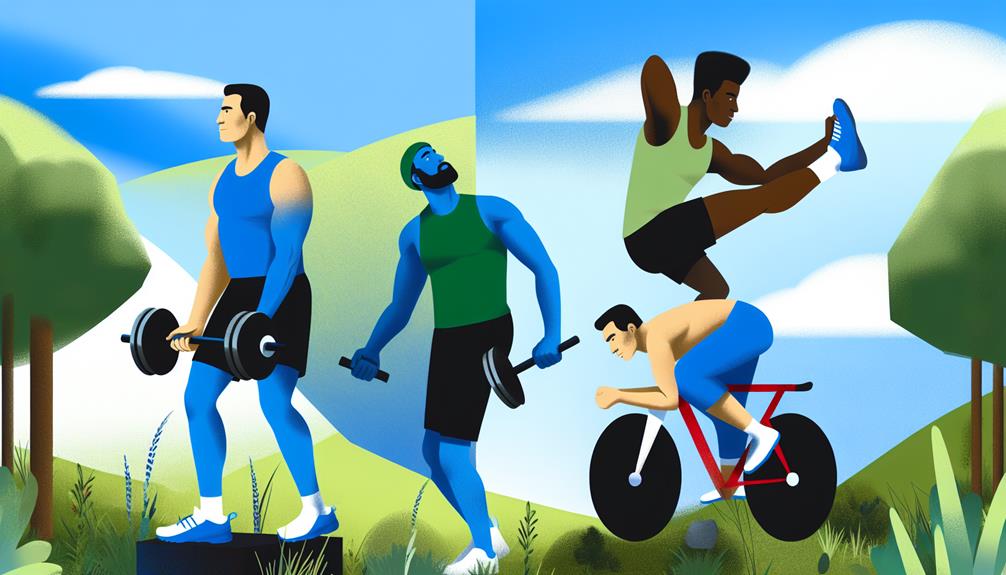To enhance male hormones naturally, I focus on seven essential strategies. First, I prioritize quality sleep, aiming for 7-8 hours nightly. A balanced diet rich in protein, healthy fats, and fiber is vital, along with ensuring ideal vitamin D levels. Staying hydrated supports energy and hormone balance, while regular exercise boosts testosterone. Managing stress through mindfulness techniques keeps my hormones in check, and I limit alcohol intake to promote overall well-being. Each of these strategies plays a significant role, and if you're curious about how to implement them effectively, you'll find even more insights ahead.
Prioritize Quality Sleep

When it comes to optimizing male hormones, my sleep quality plays a significant role that I can't afford to overlook. The connection between sleep and hormone balance is well-documented, and prioritizing quality sleep has become essential for me. First off, ensuring good sleep hygiene is important. I focus on creating a sleep environment that's dark, quiet, and cool to promote melatonin production, which is crucial for regulating my circadian rhythms.
Establishing a consistent bedtime routine has also made a considerable difference. I try to go to bed and wake up at the same time every day, which helps reinforce my body's natural rhythms. Before bed, I incorporate relaxation techniques such as deep breathing or gentle stretching to wind down. These practices prepare my mind and body for restorative sleep.
Sleep duration is another key factor. I aim for at least seven to eight hours of quality sleep each night. Insufficient sleep can lead to disruptions in hormone levels, potentially increasing the risk of sleep disorders like insomnia or sleep apnea. These can further exacerbate hormonal imbalances, creating a vicious cycle I don't want to fall into.
Maintain a Balanced Diet
A well-rounded diet is fundamental for optimizing male hormones and supporting overall health. When I think about maintaining a balanced diet, I focus on several key components. First, I make sure to include high-quality protein sources, like lean meats, fish, legumes, and dairy, which are essential for hormone production. Healthy fats, particularly from avocados, nuts, and olive oil, play a significant role in hormone regulation too.
I also pay attention to my fiber intake. Consuming plenty of fruits, vegetables, and whole grains helps promote gut health, which is critical for hormone balance. Maintaining a proper micronutrient balance is another priority; vitamins and minerals like zinc, magnesium, and vitamin D are vital for testosterone production and overall well-being.
Meal timing can influence hormone levels, so I try to eat regular meals and snacks throughout the day. Portion control is equally important; overeating can lead to hormonal imbalances. I've found that reducing sugar intake helps stabilize blood sugar levels, which can positively impact hormone health.
I also consider adopting a plant-based diet, as these diets are often rich in nutrient density and provide a wealth of beneficial nutrients. By focusing on whole foods and minimizing processed options, I can enhance my health and support my hormonal balance. In my journey toward optimizing male hormones, maintaining a balanced diet has been a game-changer.
Exercise Regularly

How can regular exercise transform your hormonal health? I've found that incorporating exercise into my routine isn't just about looking good; it's a powerful way to optimize my hormones naturally. Research shows that both strength training and high-intensity workouts can greatly boost testosterone levels, which is vital for muscle mass, energy, and overall well-being.
When I engage in strength training, whether it's lifting weights or bodyweight exercises, I notice not just physical changes but also an increase in my confidence and mood. Studies indicate that resistance training can elevate testosterone levels for up to 48 hours post-workout, making it a valuable part of my weekly regimen.
High-intensity interval training (HIIT) has also become a favorite of mine. These short bursts of intense exercise followed by rest periods not only keep my workouts efficient but also trigger a hormonal response that promotes fat loss and muscle gain. I've seen firsthand how a strategic HIIT routine can help maintain my energy levels and improve my overall fitness.
Additionally, regular exercise positively impacts my stress levels, which is essential for hormonal balance. When I make time for physical activity, I feel more equipped to tackle daily challenges, leading to a healthier lifestyle overall.
Incorporating both strength training and high-intensity workouts into your routine can be a game-changer for your hormonal health. Trust me, it's worth the effort!
Manage Stress Effectively
Managing stress effectively is essential for optimizing male hormones, and I've found that incorporating mindfulness and meditation techniques can make a significant difference. Not only do these practices help calm the mind, but regular exercise also serves as a powerful tool for stress relief. By focusing on these strategies, we can create a healthier hormonal balance and improve overall well-being.
Mindfulness and Meditation Techniques
Stress can feel like an unwelcome weight on your shoulders, but incorporating mindfulness and meditation techniques into your daily routine can lighten that load. I've found that simple practices like breathing exercises can make a significant difference. By focusing on my breath, I can calm my mind and reduce anxiety, which in turn helps balance my hormones.
One technique I particularly enjoy is guided imagery. Picture a serene landscape—maybe a beach or a forest. As I visualize this calming scene, I allow myself to feel the peace it brings. This practice not only distracts me from stress but also fosters a sense of relaxation that's essential for maintaining ideal hormone levels.
I recommend setting aside just a few minutes each day for these practices. Whether it's breathing deeply or immersing yourself in guided imagery, the key is consistency. Research shows that regular mindfulness can lower cortisol levels, the stress hormone that can wreak havoc on our bodies. By embracing these techniques, I've noticed improvements in both my mental clarity and overall well-being. So, why not give it a try? You might be surprised at how much lighter you feel.
Exercise for Stress Relief
Incorporating even a small amount of exercise into my daily routine has proven to be a powerful antidote to stress. I've found that activities like yoga and nature walks not only help me unwind but also boost my overall well-being. The yoga benefits are particularly striking; it promotes relaxation, enhances flexibility, and encourages mindfulness. Each session leaves me feeling more centered and less anxious.
Nature walks have also become a staple in my routine. There's something incredibly calming about being surrounded by greenery and fresh air. Research shows that spending time in nature can lower cortisol levels—our body's primary stress hormone. I notice that after a brisk walk, I'm not just physically rejuvenated, but my mind feels clearer and more focused.
Moreover, regular exercise releases endorphins, the feel-good hormones that help combat stress and anxiety. Whether it's a yoga class or a peaceful stroll in the park, I'm reminded of how essential it is to carve out time for physical activity. By managing stress effectively through exercise, I'm not only optimizing my mental health but also supporting my hormonal balance. So, let's get moving and embrace these powerful strategies!
Optimize Vitamin D Levels

Boosting your vitamin D levels can be a game-changer for optimizing male hormones. I've found that adequate vitamin D is essential not just for bone health, but also for maintaining testosterone levels. If you're like me, you might not always get enough sun exposure, especially during those long winter months. That's where being mindful of seasonal effects comes into play.
When the sun's rays are scarce, it's vital to incorporate vitamin D rich foods into your diet. Fatty fish, egg yolks, and fortified foods can help, but sometimes that's still not enough. I've learned that testing methods, such as blood tests, can reveal your vitamin D status, guiding you on whether you need to adjust your intake.
If your levels are low, supplementation options are plentiful. Vitamin D3 is often recommended, as it's more effective at raising levels compared to D2. However, absorption factors like your gut health and even the time of day you take your supplements can influence effectiveness.
Stay Hydrated
After enhancing vitamin D levels, it's easy to overlook another vital aspect of hormone health: hydration. Staying properly hydrated is essential, not just for overall health, but specifically for maintaining ideal hormone levels. I've learned that even slight dehydration can negatively impact my physical performance and hormonal balance.
Here are some key hydration benefits I've discovered:
- Improved energy levels: Staying hydrated helps combat fatigue, keeping my energy steady throughout the day.
- Enhanced mood: Proper hydration plays a role in regulating mood, helping me feel more balanced and focused.
- Better digestion: Adequate water intake supports digestive health, which can influence hormone levels.
- Increased testosterone production: Studies show that dehydration can lead to lower testosterone levels, highlighting the importance of fluid balance.
To reap these hydration benefits, I aim for a consistent water intake throughout the day. I've found that drinking at least eight 8-ounce glasses of water daily is a good starting point, but I adjust this based on my activity level and climate conditions. Remember, thirst isn't always a reliable indicator of hydration, so I keep a water bottle handy to remind myself to sip regularly.
Incorporating hydrating foods like fruits and vegetables into my diet also helps. So, whether it's carrying a water bottle, setting reminders, or enjoying hydrating snacks, I've made hydration a priority for my hormone health. By doing so, I'm supporting my body's natural functions and enhancing my well-being.
Limit Alcohol Intake

While many people enjoy a drink now and then, limiting alcohol intake is essential for maintaining ideal hormone levels. I've learned that excessive alcohol consumption can notably impact our hormone balance, especially testosterone levels. Research shows that heavy drinking can lead to a decrease in testosterone production, which can affect everything from mood to muscle mass.
When I decided to cut back on alcohol, I began exploring various alcohol alternatives that not only satisfy my cravings but are also better for my liver health. Many of these alternatives, such as sparkling water with fruit or herbal teas, have become my go-to choices. They keep me social without the negative effects of alcohol.
Moreover, it's important to understand how alcohol affects the liver. The liver plays a key role in hormone metabolism and detoxification. When we drink excessively, we're putting additional stress on this significant organ, which can lead to hormonal imbalances. I've noticed that since I've limited my alcohol intake, my energy levels and overall well-being have improved.
If you're looking to optimize your male hormones naturally, consider reducing your alcohol consumption. Not only will it help maintain your hormone levels, but it will also promote better liver health. Plus, embracing alcohol alternatives can be a fun and invigorating way to stay social without compromising your health. Remember, moderation is key, and your body will thank you for it!
Frequently Asked Questions
Can Supplements Improve Hormone Levels Naturally?
I've often wondered if supplements can really improve hormone levels naturally. From what I've learned, herbal remedies like ashwagandha and fenugreek can indeed support hormonal balance. Additionally, the benefits of exercise can't be overstated; regular physical activity boosts testosterone and overall hormone health. Combining these approaches seems like a promising strategy. However, it's essential to consult with a healthcare provider before trying new supplements to guarantee they're right for you.
How Do Age and Hormones Correlate in Men?
You know, it's like watching a classic car slowly lose its shine over the years. As I've learned, age impacts men's hormones considerably, leading to hormonal decline. Testosterone levels can drop as I get older, affecting energy, mood, and overall health. Studies show that this decline isn't just about getting older; lifestyle choices also play a role. Understanding this correlation helps me make informed decisions about my health as I age.
Are There Specific Foods That Boost Testosterone?
Absolutely, I've found that certain testosterone-rich foods can make a difference. Incorporating foods like eggs, lean meats, and nuts into my diet has helped me feel more energized. I've also noticed that nutrient timing matters; eating these foods around workout times seems to boost my testosterone levels more effectively. It's fascinating how what I eat can influence my hormones, and I'm excited to keep exploring this connection!
What Role Does Genetics Play in Hormone Levels?
Did you know that about 50% of testosterone levels can be attributed to genetic predisposition? I've found this fascinating because it highlights how our genes play an essential role in hormone regulation. While lifestyle factors matter, our genetic makeup influences how our bodies produce and manage hormones. Understanding this connection can help us appreciate the complexity of hormone levels and the importance of personalizing any approach to maintaining balance in our bodies.
When Should I Consult a Doctor About Hormone Issues?
If I notice persistent symptoms like fatigue, mood swings, or low libido, I know it's time to consult a doctor about hormone issues. Recognizing these symptoms is essential, as they can greatly influence my lifestyle and overall well-being. I've learned that addressing hormone imbalances early can lead to better health outcomes. So, if you're feeling off, don't hesitate; reaching out to a healthcare professional can make all the difference.
